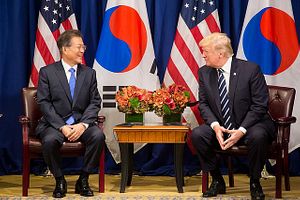Translation has always been an important factor in South Korean diplomacy. Each and every term that the translator uses has almost always influenced the course of international affairs between South Korea and a foreign state.
When U.S President Donald Trump met with South Korean President Moon Jae-in on September 21, he was pleasantly surprised when Moon’s translator used the term “deplorable” while interpreting President Moon’s statement.
The term “deplorable” has been regarded as a lucky charm for Trump, ever since his opponent Hillary Clinton used the term to describe white conservatives during her presidential campaign in 2016. It served as a turning point for the then-presidential candidate Trump to muster his supporters and gain higher ground in his presidential competition against Clinton.
South Korean media praised the translator for helping lighten the tense mood that lay between the two presidents during their meeting. In response to the translation, Trump made a joke, saying “I’m happy you used the world ‘deplorable.’ I was very interested in that word.”
Considering that the meeting might have ended on a more serious note, with Trump making explicit complaints about the US-ROK Free Trade Agreement — “so bad for the United States and so good for South Korea” — the translator’s sophisticated choice of words seems to have eased the mood of the meeting.
Kim Jong-min, a secretary at the Ministry of Foreign Affairs and the translator responsible for the occasion, said that “the term [deplorable] was a meaningful expression for the presidential elections in the United States, but I did not expect President Trump to like it this much.”
Translation has also helped set up a bridge of understanding that transcends cultural connotations when practicing diplomacy in South Korea. In July 1993, the then-South Korean President Kim Yong-sam used the opportunity to meet with the then-U.S. President Bill Clinton to offer a traditional, brush-written scroll with a four character Chinese idiom that he himself wrote: Dae-Do-Mu-Moon(大道無門). Literally meaning “righteousness overcomes all obstacles,” Clinton did not seem to fully understand the idiom. Park Jin, the then- senior translator for Kim, translated the idiom as “a freeway has no tollgate.” Clinton finally understood the meaning of the gift.
Park has been well-known for his moderate translations in sensitive situations. During a phone conference with Clinton following a North Korean nuclear crisis in 1994, a frustrated Kim made a strong complaint in Korean which could have been directly translated as “and you call this an alliance” However, Park brought the phrase into more moderate terms and made an indirect translation asking “how can we describe our relationship as a sound relationship?”
As important as translations are, mistranslations may bring devastating consequences. On August 9, 2016, at a seminar at China’s Pangoal Institution, a Chinese professor made a statement on the issue of deploying THAAD in South Korea saying “the People’s Republic of China and the Democratic People’s Republic of Korea may revert to alliance if the THAAD is brought into the Korean peninsula.” A translator for the Korean delegation misinterpreted his statement and used the term “blood-forged alliance” to describe the relationship that China and North Korea may revert to. This set off great confusion in the South Korean political sphere as the Chinese government has been officially opposing the expression “reversion to a blood-forged alliance between the People’s Republic of China and the Democratic People’s Republic of Korea” which implies severing diplomatic ties with South Korea. Chinese public media derided the Korean delegation, saying that they “could not say a word in front of our strong pressure.”
Inscribed on the official jacket worn by the Republic of Korea Air Force interpreting officers, a leading group of translators in South Korea, is “Relata Refero,” a Latin phrase meaning “I tell what I have been told.” It is a reminder that the importance of translation cannot be disregarded in practicing proper diplomacy in South Korea. As a Korean saying goes, a good tongue is always a good weapon.

































